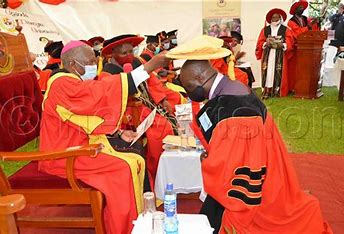
I have before written an article, which did not mince with words, but decried the fact that Uganda’s education is enslaving, not emancipatory. The most enslaving education is found in our institutions of higher learning.
When one enters University, one is lucky if it is not the university that selects for one what courses to study. This act is the beginning of introducing the student into an enslaving education.
For the majority of the students, they spend three or more years doing courses that they never wanted to take. When one does not choose what to study one is indeed going to be a slave in the mind or, for that matter, academically fixed and instructed in what one would not choose to study if one were free to do so. One cannot choose one is enslaved.
So, what this means is that for the majority of Ugandan youth they are being prepared to be willing slaves. Indeed, these days when they get out of the university, without any professional leaning they are ready to become anything in society. They are joining the voluminous numbers, the expanding labour reserve, now feeding the modern slave markets in the Middle East.
Or else they are doing all sorts of poorly paid jobs. The lucky ones have created jobs for themselves often unrelated to what they studied at university.
Structural enslavement of minds is, and has been, pronounced in our universities since the colonialists brought them to us. I am saying universities, but really it was one university the colonialists left for us – The University of East Africa, of which Makerere University College was a constituent College.
Structural enslavement in the College, Makerere University, which succeeded it, and the many universities that have sprang up may be within a School, Faculty, Department or discipline. Where the compartmentalization is strictly adhered to.
It is a fact that interaction of scholars of one faculty, school, department or discipline is limited. This is dangerous in this century when the struggle for critical thinking, genuine interaction, sustainability and future ready professionals who can think freely and independently, is picking up, at least globally.
It is extremely difficult to be a free, independent and critical think when squeezed in a discipline, department, school or faculty in a university. Each school, faculty, department and discipline has its own way of protecting itself from what are taken to be pollutant ideas from elsewhere.
When one is squeezed that way one is really enslaved. One will not know that knowledge is one and interconnected, with dimensions that not necessarily exclusive.
Therefore, subdivisions of knowledge into humanities, social science and natural science, or, worse still, into disciplines, are artificial and mind-enslaving. Human brains can handle far more than they are usually forced to handle – narrowly!
The cyberage, which the age of today, is anti-knowledge slavery. It requires all knowledges in an interconnected manner to confront age knowledge pandemic, which is more deadly than Covid 19.
Yes, if we are going to have critical thinker, who will not be manipulated in mind and otherwise by adroit actors in our environment, including the academia, we must act quickly to make higher education emancipatory.
Fortunately, we have new cultures of learning that singly and collectively are emancipatory. These are: interdisciplinarity, crossdisciplinarity, transdisciplinary and Non-disciplinarity. Many universities across the globe have opened up to these cultures of learning.
In Uganda, at least Mbarara University of Science and Technology has opened up to interdisciplinarity. While we have a plethora of disciplinary scholars, many scholars are now active in the new cultures of teaching and learning.
If one is enslaved in mind one is absolutely enslaved. If one studies the sociology of our elites, one will find that they all virtually suffer mind enslavement, reflecting their university education. Many find it difficult to engage 8n critical thinking.
Many cannot effectively with others outside their professional orientation. Many are not future-ready professionals. The majority are environmentally-poor and cannot add value to environmental struggles. They are the worst enemy of a safe, clean and secure environment.
Until our higher education begins to experience emancipatory change, we shall continue to produce people better ready to be slaves at whatever level of education than to be future ready professionals.
For God and my country – Uganda!
- A Tell report / By Prof Oweyegha-Afunaduula, a former professor in the Department of Environmental Sciences of the Makerere University, Uganda











